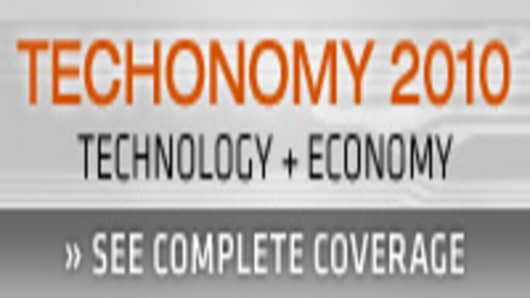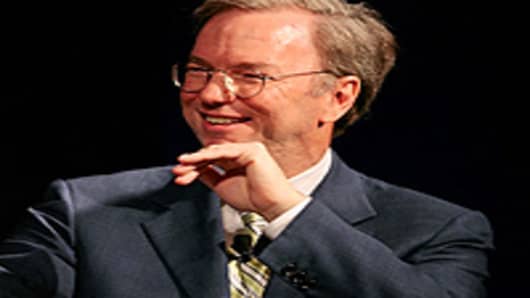Techonomy's opening night event was unlike anything I've seen at other conferences: an interactive brainstorming session led by legendary tech investor John Doerr and famed inventor Dean Kamen. They asked for all 250 attendees to call out big picture topics to discuss—gathering ideas from "data flow" to "intellectual property use." And they called on Amazon CEO Jeff Bezos and Google CEO Eric Schmidt to contribute their ideas -- and they did.
Hewlett Packard's EVP and Chief Strategy and Technology Officer Shane Robison introduced the evening with his thoughts on the goals of the conference, and why HP is sponsoring the event. Robison said, "We can redefine the entire industry and create the backbone for growth by looking at technology and economy together."
Bottom line: we're all searching for growth, and a wave of innovationis redefining what's possible. Using technology to bring more people out of poverty into the middle class creates a huge opportunity for consumer companies. Robison says information technology is the key to democratizing the world.
Doerr, who backed tech giants, including Google, Amazon, Sun Microsystems, and Symantic , said he wanted the week's conversations to spark the creation of companies that we'll be talking about in a few years. He opened up the floor for input on what topics they should discuss. And he introduced Kamen, one of the great inventors of our age, asking whether or not the Segway was a success. Kamen quipped "wait for history to write the chapter, just like it did for airplanes and cars."
What does it take to create an Internet treasure like Apple, Amazon, Google, or Facebook? Doerr called on Bezos to answer the question. Bezos' first response was that the key ingredient is extraordinary luck—planetary alignment.
Then he said that as consumers become more empowered and the balance of power shifts to consumers, entrepreneurs need to embrace that transition. "In the old world you might have spent 70 percent of your time shouting about your services and 30 percent o your time inventing them," Bezos said. "Now you might invert that."
Bezos threw a question back, asking Doerr and Kaman what consitutional amendment they'd make. Both griped about Congress. Kamen said politicians ought to say what they're going to do before they get elected and be barred from running again if they don't accomplish it. Doerr said the US Senate must be fixed, saying "the notion that 41 people can bar something important from happening is pretty remarkable."
Google's Eric Schmidt weighed in, saying what you really need is redistricting: "If you created a parallelogram for each district, it would solve all the problems."
As to his theory for what it takes to create an Internet treasure, Schmidt looked to the nation's youth, saying that young people challenge assumptions. This is an area that's particularly dear to Kamen, whose non-profit First trains a new generation of science and technology leaders.
There was plenty of talk about creating a new energy economy and green tech. Kamen says that the problem is that people of wealth disproportionately consume energy, which, needless to say, is a major problem when it comes to improving the standard of living for the world's poor. Kamen says we need to find new solutions that create wealth as they reduce energy consumption. He cited one of his inventions—a box that sucks the methane out of cow dung and powers electricity.
The evening wrapped up with comments from two serial entrepreneurs. Bill Gross, the founder of IdeaLab, expressed his great optimism about green energy, saying that the next big technological innovation will be in thermal energy storage, saying it will be able to beat fossil fuels in just three to five years. Gross wasn't advocating for regulation or government incentives: he said "no laws, just technology." Gross insists that thermal energy will be so economically efficient, it will be adopted without any governmental push.
The final speaker was Rey Ramsey, Chairman of One Economy Corp., which uses technology and the Internet to connect low-income people to the mainstream, and economic opportunities. His was also an optimistic message, "everybody needs somebody to say yes to them."
He told the story of how one inner-city family grew a business, managed a health problem and broadened its horizons thanks to a computer and Internet connection. This seems to be the message of the conference: technology is a democratizing force and it makes anything is possible
Questions? Comments? MediaMoney@cnbc.com





